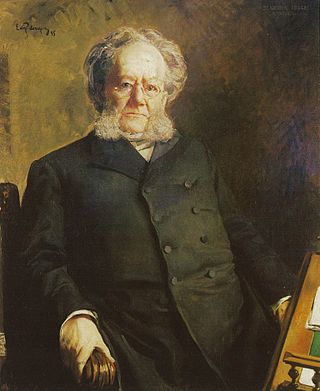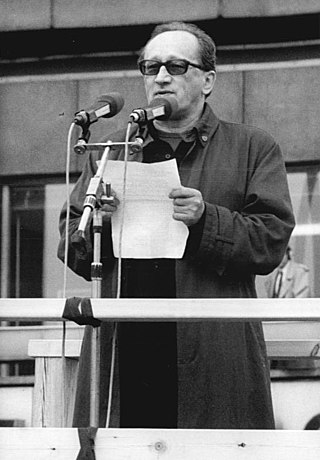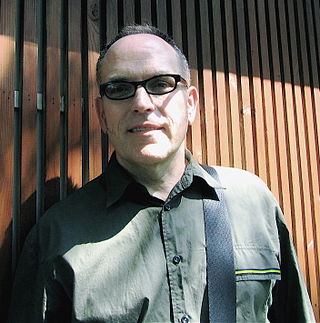
Henrik Johan Ibsen was a Norwegian playwright and theatre director. As one of the founders of modernism in theatre, Ibsen is often referred to as "the father of realism" and the most influential playwright of the 19th century, as well of one of the most influential playwrights in Western literature more generally. His major works include Brand, Peer Gynt, Emperor and Galilean, A Doll's House, Ghosts, An Enemy of the People, The Wild Duck, Rosmersholm, Hedda Gabler, The Master Builder, and When We Dead Awaken. Ibsen is the most frequently performed dramatist in the world after Shakespeare, and A Doll's House was the world's most performed play in 2006.

Heiner Goebbels is a German composer, conductor and professor at Justus-Liebig-University in Gießen and artistic director of the International Festival of the Arts Ruhrtriennale 2012–14. His composition Stifters Dinge (2007) received five votes in a 2017 Classic Voice poll of the greatest works of art music since 2000, and writers for The Guardian ranked his composition Hashirigaki (2000) the ninth greatest classical composition of the same period.

Peer Gynt is a five-act play in verse written in 1867 by the Norwegian dramatist Henrik Ibsen. It is one of Ibsen's best known and most widely performed plays.

Heiner Müller was a German dramatist, poet, writer, essayist and theatre director. His "enigmatic, fragmentary pieces" are a significant contribution to postmodern drama and postdramatic theatre.

Jon Olav Fosse is a Norwegian author, translator, and playwright. In 2023, he was awarded the Nobel Prize in Literature "for his innovative plays and prose which give voice to the unsayable."
The Kleist Prize is an annual German literature prize. The prize was first awarded in 1912, on the occasion of the hundredth anniversary of the death of Heinrich von Kleist. The Kleist Prize was the most important literary award of the Weimar Republic, but was discontinued in 1933.

Bibiana Beglau is a German actress.

Alfred Harth, now known as Alfred 23 Harth or A23H, is a German multimedia artist, band leader, multi-instrumentalist musician, and composer who creatively mixes genres.

Cinema in Norway has a long history, dating back to the beginning of the 20th century, and has an important stance in European cinema, contributing at least 30 feature-length films a year.

Den Nationale Scene is the largest theatre in Bergen, Norway. Den Nationale Scene is also one of the oldest permanent theatres in Norway.
The Konrad Wolf Prize is a German performing arts, new media art and film award given since 1986 by the Academy of Arts, Berlin. It is named after the East German film director and former president of the Academy, Konrad Wolf. The prize is awarded annually, alternating between the Academy's Performing Arts Section and its Film and Media Art Section, and comes with a 5,000 Euros purse.

The Norwegian Ibsen Award is awarded to promote Norwegian drama and is awarded only to playwrights.

Ivo van Hove is a Belgian theatre director. He is known for his Off-Broadway avant-garde experimental theatre productions. For over twenty years, he served as the director of the Toneelgroep Amsterdam. On Broadway, he has directed revival productions of Arthur Miller's A View from the Bridge, and The Crucible, Lee Hall's Network in 2018, and Leonard Bernstein and Stephen Sondheim's West Side Story in 2020. Among his numerous awards he has received a Tony Award and a Laurence Olivier Award for A View from the Bridge. He was made a Knight of the Ordre des Arts et des Lettres in France in 2004, and a Commander in the Order of the Crown in 2016.
The Theaterfestival Spielart is an international theatre festival which takes place every two years during November and December in Munich, starting in 1995. The festival lasts between 15 and 17 days. Guests usually include over 20 international theater and performance groups.
Nora Bergliot Ibsen is a Norwegian theatrical producer, noted for being the producer of the 2006 Ibsen Year, Norway's major anniversary of playwright Henrik Ibsen's death 100 years earlier, including high profile celebrations in multiple countries. The Ibsen Year was one of the Norwegian government's major cultural undertakings in 2006, aimed at increasing appreciation of Henrik Ibsen and Norwegian culture internationally. The Ibsen Year comprised 8213 separate cultural events, and 83 countries took part in the commemoration.
The Ibsen Year was the Norwegian government's official celebration of Henrik Ibsen in 2006, marking the 100th anniversary of his death. The Ibsen Year included cultural events in multiple countries, including an opening ceremony in Oslo attended by the royal family and international guests, television programs, cultural events in Italy, Germany, the United Kingdom, the United States, China and other countries, and an International Gala performance at the Great Pyramid of Giza in Egypt, hosted by the country's First Lady Suzanne Mubarak and also attended by Queen Sonja. The Ibsen Year's artistic director was Bentein Baardson and the producer was Nora Ibsen. The chairman of the supervisory committee was former Norwegian Minister of Culture Lars Roar Langslet. The planning committee of the Ibsen Year had a core budget of around 70 million NOK, not counting TV productions and various other costs.

The Ibsen Centennial Commemoration Award was awarded by the Government of Norway in commemoration of playwright Henrik Ibsen on the occasion of the 2006 Ibsen Year, the 100th anniversary of Ibsen's death. The prize was awarded to 14 actors and 3 officials of state.
Christoph Marthaler is a Swiss director and musician.
The Theaterpreis Berlin is a German theatre award, created in 1988 by the Stiftung Preußische Seehandlung in Berlin. It is awarded annually at the Berliner Theatertreffen to a person in German-language theatre. The prize sum is €20,000.

Lola Arias is an Argentine writer, theatre, and film director known for her diverse creative pursuits spanning multiple artistic media.













